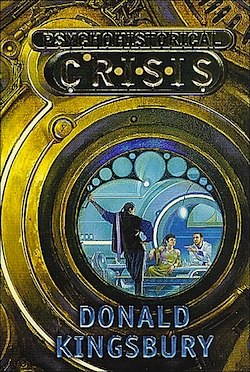Psychohistorical Crisis (2001) is set in our far far future, with humanity spread out across the galaxy. It begins with a psychohistorian called Eron Osa seeing his “fam” destroyed, and with it the better part of his mind and his memory. The story goes backwards and forwards from there as we discover who Eron is, what a fam is, how he got into this position, and what kind of universe this is. The “fam” is a unique and specialised brain augmentation which everyone is fitted with as a child. People can’t wear each other’s fams, but fams can be upgraded and adjusted. Kingsbury does remarkably well with giving us characters who are people while being convincingly superhuman with this augmentation—it’s casually mentioned that nobody but children plays chess, because every game is bound to be a draw, like tic-tac-toe (noughts and crosses). What’s also brilliant here is the reality of millennia of recorded history and predictable futures, which both—future and past—are simultaneously knowable and unknowable. There’s a whole galaxy and a whole lot of history, and it feels real, and the psychohistorical methods of prediction and manipulation are fascinating. The texture and depth of the history is excellent—it’s full of throwaway details that feel exactly right and add up to more than the sum of the parts.
Psychohistory is Asimov’s term of course, and it isn’t just the concept that Kingsbury has borrowed. Psychohistorical Crisis is a kind of unauthorised sequel to the original three Foundation books. Kingsbury has filed the serial numbers off, but just barely—”Terminus” is “Faraway” and Hari Seldon is “the Founder.” Anyone who has read Asimov’s originals will immediately recognise everything, and Kingsbury clearly intends that we do. But because it’s his own Galactic Empire he’s free to discard the aspects of Asimov’s universe that he didn’t want, or that accreted later in sequels by Asimov and others. There’s no connection to the Robots universe, and no psi powers—psychic manipulation here is technological and always has been, proto-versions of the fam, developed from psychic probes.
Kingsbury manages to pull off the difficult job of having his cake and eating it—when you work with an established universe (including the real world) people bring their accumulated knowledge of that universe to it and you can’t contradict what they know. They also care, and the caring gives the universe weight—which is an advantage and simultaneously a disadvantage—the pre-existing material has weight of caring already, and new material added has to hold up that weight. I talked about problems with that with Hambly’s Sun Cross books.
What Kingsbury is doing here is very unusual—he’s taking the history of the First Galactic Empire and all the events of the original Foundation trilogy for granted and extrapolating on from there into another era of history and a Second Galactic Empire, one ruled by psychohistorians and in which everyone has a fam. He’s giving us a rigorously extrapolated science fictional novel that’s doing something entirely new and interesting thousands of years later than the original novels, but taking Asimov’s work as the axioms from which to extrapolate. He’s asking what would happen after the psychohistorians had won—and we’ve been told psychohistory doesn’t work on people who know about it.
When I heard the book described before I read it I was extremely skeptical. It’s very rare to run across something doing something new with somebody else’s ideas and universe. Even sequels to popular stories by the original author are often just “more” rather than doing something different. But Kingsbury genuinely is doing something different, and something he really couldn’t have done without building on Asimov’s books, and he makes it work.
It’s similar with Asimov in some other ways. I’m more inclined to forgive Asimov’s absent or cliched female characters in the forties than Kingsbury writing in this century. Both men write in a clear transparent style which you either like or you don’t. In addition to this, the excitement to be had here is almost entirely intellectual—I only care about the characters in the coldest possible way. This is really the story of whole societies and vast spans of time, we have characters almost as examples. What’s deeply felt is the engagement with the ideas. I’ve heard some books described as “Id books.” Psychohistorical Crisis is a superego book if ever there was one. But that’s certainly part of its charm.
This is only the second time I’ve read Psychohistorical Crisis, and thus it completes my first reading. The reason for the ten year gap was because of the lack of emotional engagement—I often re-read to visit with characters, less often for thought provoking questions of what is knowable and the way history repeats. I picked it again up now because I’ve been thinking about psychohistory and societal manipulation. But both times I have read it I have been completely engaged and enjoyed the experience. It’s a book I like much better when I’m in the middle of it. I’ve talked before about the joy of having a world unfold itself in your head—in Psychohistorical Crisis that’s what you’re getting, in multiple dimensions, well done and well sustained, with all the details pleasing and clicking perfectly into place. It’s worth noting that that’s all you’re getting, but it’s very much worth having for what it is.
Jo Walton is a science fiction and fantasy writer. She’s published two poetry collections and nine novels, most recently Among Others, and if you liked this post you will like it. She reads a lot, and blogs about it here regularly. She comes from Wales but lives in Montreal where the food and books are more varied.










